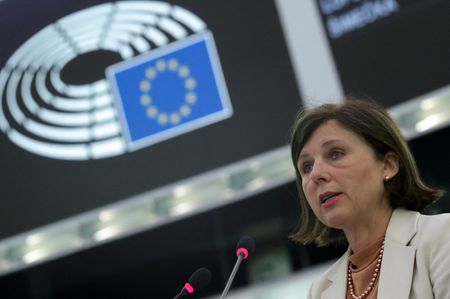By Gabriela Baczynska
BRUSSELS (Reuters) -The European Union’s latest democracy health check showed there was no significant deterioration across the 27-nation bloc in areas like media and court freedoms or efforts to tackle corruption over the last year, a top official said on Wednesday.
The assessment came as the EU executive released its latest rule of law report, which includes tips for democratic improvements across EU member states.
Last year’s snapshot highlighted serious concerns about the rule of law in Poland and Hungary. Both governments lost access to billions of euros in EU aid over related disputes.
“This rule of law report shows that there is no radical worsening or backsliding in any member state,” said a deputy head of the Commission, Vera Jourova.
“I will never be satisfied, in general, because there are a lot of things to be improved,” she continued.
She noted some improvements to the independence of the judiciary in Hungary, as Budapest sought to unlock access to EU grants. The report still called on the nation to make improvements in areas including the independence of media and prosecutions of high-level corruption.
Civil Liberties Union for Europe, a Berlin-based human-rights watchdog group, said the way the Commission’s report highlighted progress in Hungary was a striking example of embellishing reality.
“Most member states have made little effort to address documented rule of law problems, have left existing shortcomings unaddressed, or have made matters worse in all areas examined,” the group said in a statement.
It highlighted what it said were “worrying developments” around NGOs and media in Italy and Sweden, and said that in most member states the overall rule of law situation “continues in the wrong direction.”
CONCERNS
On Poland, the Commission report said there had been no progress towards 2022 recommendations including ensuring the independence of state prosecutions and fair procedures in awarding media licenses.
It said media pluralism was at “very high risk” in Bulgaria, Poland, Romania and Hungary, and at “high risk” in Croatia, Cyprus, Greece, Slovenia and Malta.
Spain, which holds a national election on July 23, was among the countries warned over the state of its judiciary. The report reiterated “serious concerns” over the failure to renew the Council of the Judiciary, the country’s top body of judges.
It did not mention days of rioting across France, triggered by police shooting of a teenager of North African descent, and contained little reference to the use of excessive force by police in the country.
Jourova said it was up to courts in France to judge every situation separately.
(Reporting by Gabriela Baczynska in BrusselsEditing by Emma Rumney and Matthew Lewis)





